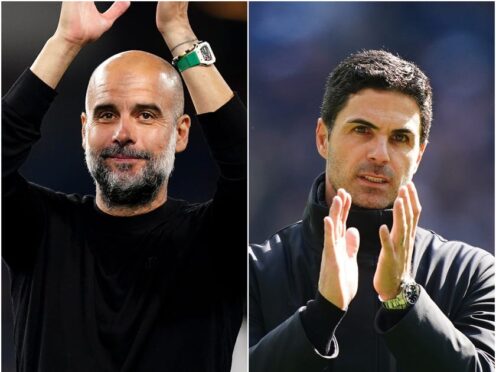Pep Guardiola and Mikel Arteta brought up personal landmarks on Sunday as their Manchester City and Arsenal teams continue to battle for the Premier League title.
City boss Guardiola reached 300 games in the English top flight, with Arteta recording his 100th win.
Here, the PA news agency looks at how their records compare with the Premier League’s best.
300 up for Pep

Guardiola’s record in his first 300 Premier League games is unparalleled.
With 221 wins, he is the only manager to even hit 200 in that span – Jose Mourinho is his nearest challenger with 189, one more than Guardiola’s long-term rival Jurgen Klopp.
His 704 points are 70 more than Mourinho managed in his first 300 league games with Chelsea and Manchester United, with Klopp again one further back.
Sir Alex Ferguson, winner of a record 13 Premier League titles with Manchester United including five of the first seven, had 183 wins and 627 points in his first 300 games. Arsene Wenger completes the top five by points with 617, including 180 wins.
Pep Guardiola is one of one ☝️ pic.twitter.com/KKOzfwLK4c
— Premier League (@premierleague) April 28, 2024
Guardiola’s 38 defeats are one fewer than Ferguson in the equivalent span and the fewest among the top five, thanks to an ongoing 19-match unbeaten league run as City’s traditional form in the second half of the season shows no sign of letting up.
Guardiola is the 19th manager to reach 300 Premier League games and will end the season with the 18th-most, passing the late Joe Kinnear’s tally of 302.
Should he remain in charge for the whole of next season he will climb to 342 games, one place and nine games ahead of Klopp. That would rank him 13th for games in charge, should Everton boss Sean Dyche, currently 10 games above Guardiola, also see out the season.
Arteta’s century

Wenger lost one Arsenal record on Sunday as Arteta reached three figures for wins in his 169th Premier League game in charge.
That is 10 games fewer than Wenger took to reach the mark and makes Arteta the fifth-quickest overall in the Premier League era.
Guardiola once again heads a familiar list, having won 100 of his first 134 games at City. Mourinho took 142 games to reach his century, Klopp 159 and Ferguson 162.
Arteta is the 25th manager to reach 100 wins and the next name ahead of him on the list is another Arsenal great, George Graham on 102.
Arteta could overtake him in the remainder of this season if his side beat Bournemouth, Manchester United and Everton in succession, but it might still not be enough to win the title should City win all four of their remaining games.
